Speak to a South Africa expert today
and start planning your tailor-made holiday

Alistair

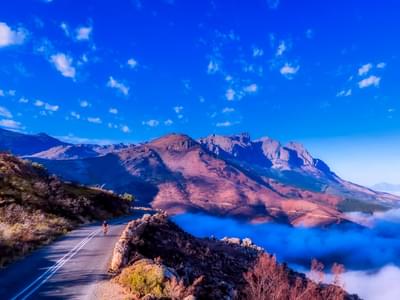
My heart sank as the traffic policeman pulled us over whilst we attempted to negotiate our way out of Johannesburg airport. Hubbie calmly opened the window, ready for battle man-to-man. I helpfully shoved the guide books out of sight in the deluded hope that our tormentor wouldn’t realise we were new in town. A rather pointless exercise since we were driving a clean and shiny white Ford Ikon, which just screamed ‘tourist’ from every angle. Plus we’d just driven from the rental car port.
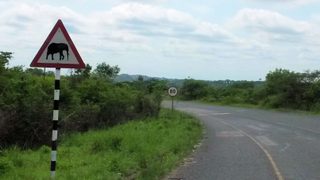
Officer: Good morning sir, how are you? I don’t really care how you are, I just need to gauge the weight of your wallet.
Hubbie: I’m very well officer, how are you? I also don’t care, but smiling and nodding always helps.
Officer: Did you not see the ‘Stop’ sign back there sir? Of course there isn’t a sign, but these tourists won’t know any better, especially as they’ve been in the car less than a minute!
Hubbie: No I didn’t officer, I apologise if I missed it! Damn. How on earth do we get out of this dilemma? Remember to be polite at all times to avoid making it worse.
Officer: I’m going to have to write you out a fine for R1000 which you will have to take to the police station in Kempton Park to pay. Suckers!
Hubbie: Ah, that’s no good officer, we have a 6 hour drive ahead so I’m afraid we won’t be able to do that. Whose bright idea was it to come back to this god-forsaken country? Oh, that’s right, mine.
Officer: That’s unfortunate sir. So tell me, what can I do to make this problem go away for you? Ching ching…money time!
Hubbie: How about you don’t give us a fine, officer? There’s no way I’m giving him a bribe…besides, that is an offence in itself!
15 minutes later after neither side has backed down…
Hubbie: Well officer, it looks like you’ll just have to write out the fine then. I’m calling his bluff, and if he writes it, we’ll just not bother to pay it.
Officer: Oh. Erm…well, I’ll just let you off with a warning this time sir. Humph. First time I’ve not extracted a bribe all week.
Hubbie: Thank you officer. You have a wonderful day. Bit of over-the-top smarm should seal the deal. Officer: You too sir, have a wonderful trip. You just wait, if us police don’t get you, the pot-holes will!
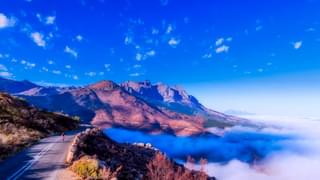
There’s no doubt about it. Self-driving inSouth Africa isn’t a walk in the park, yet if you want to explore beyond the cities (which of course you do) then hiring a car really is the only option. Public transport is limited and often unreliable so unless you have all the time in the world and a pitiful budget then it really is a no-brainer. Yet there are a few things you should know before you find out about them the hard way like we did. Hopefully a little prior knowledge will make your journey less stressful, and believe me, I think we lost a few cat lives on our most recent trip!
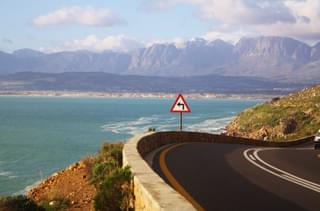
Unfortunately you’ll encounter most of these on a daily basis in both South Africa and Swaziland. You have been warned!
Potholes - The state of the roads is terrible, and even the major highways are riddled with potholes in places. Sometimes there are helpful warning signs (rather than repairs), which cause you to slow right down, only to discover there are in fact no potholes. Sometimes massive subsidence pits big enough to swallow an entire truck will be upon you with no warning whatsoever. It really is ‘pot luck’.
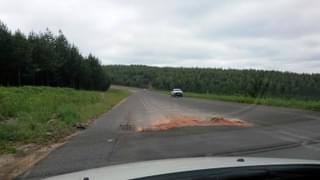
Tip: make sure your vehicle has a good spare tyre and that you have the phone number for breakdowns - we had 2 punctures on our last visit!
Assorted domestic livestock - After spending nearly 4 weeks swerving around nonchalant cattle, and swearing at timid drivers who were too scared to gently edge towards the herd in encouragement, we were utterly sick of wondering whether today was going to be the day of impact. If it wasn’t cows, it was goats and sheep. Even more arrogant were the baboons who sauntered slowly across the road, leaving us in no doubt as to who was boss! Just remember, if you hit livestock you’ll end up paying for it as the owner will appear from nowhere having witnessed the entire incident.
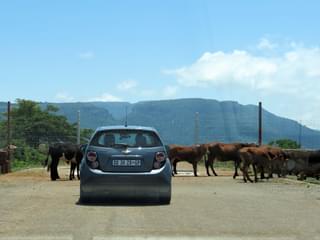
Tip: shouting ‘steak’ out of the window seems to have no effect, so you’ll just have to be patient.
The rule we found most odd was the 4-way stop junctions. Whoever arrives first has priority, but in reality the person with the biggest set of balls takes the initiative whilst everyone else dithers. Then the ditherers all go at once and mayhem ensues. This system is particularly dangerous on major highways. These junctions appear with little or no warning, so you slam on the brakes giving your wife a heart attack, and are forced to stop despite there sometimes being no other vehicles waiting to turn. Yet there’s a police car up ahead so if you don’t stop you know that’s going to be another uncomfortable conversation. One which you may not win.
Tip: don’t be shy and hang back, that will cause more problems than just going for it!
Although 4-way stops are what you normally encounter at junctions, sometimes there are traffic lights thrown in for a bit of variety. Yet they often don’t work, especially when electricity for the area has been turned off for a few hours during load shedding. During these circumstances chaos rules, and you’ll probably have to barge your way through aggressively if you want to continue your journey.
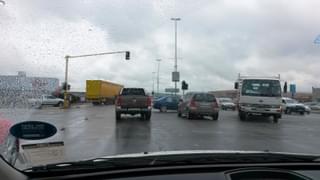
Tip: often where there are traffic lights there may be 3 lanes per carriageway so that’s potentially 12 lines of traffic to do battle with. And that’s only if it’s a mere 4 way stop. Have fun!
There are very few dual carriageways in South Africa which means constant overtaking is necessary. Surprisingly local drivers tend to dawdle rather than speed, which is just as dangerous and even more irritating. Normally overtaking wouldn’t be an issue, but add in the excitement of potential pot holes, cattle, speed bumps, police, weather and a car that doesn’t enjoy accelerating, and you’re in for a few adventures.
To assist with this, the hard shoulder rule dictates slow vehicles should pull over to allow others to pass. This works well until the hard shoulder unexpectedly runs out, or is blocked by pot holes and overrun with animals, and the overtaking vehicle is taking his merry time, preventing you from returning to the carriageway. To add to your woes, an enormous forestry truck is hurtling towards you on the oncoming side of the road so your only real option is the ditch. Or the sheer cliff. Or the cow.
Tip: Hire a car with a decent size engine, we’ve found a 1.6 just about does the job. Anything smaller then you may as well double your journey time (and halve your survival chances!), especially if laden with luggage!
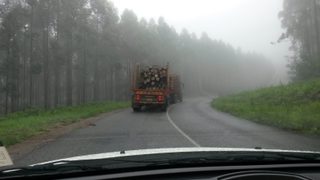
So you’ve successfully navigated to the next town, and are feeling quite pleased at having survived. Yet your joy is short-lived. There isn’t a single sign to be seen in the entire place, and you’re soon lost and cursing the day someone thought self-drive would be a good idea. After going round in circles you notice a sign in the opposite direction, so with a bit of geographical guesswork you eventually figure out where you need to be heading.
Tip: When there are signs, it’s often the smaller more obscure places that are indicated, rather than the obvious ones (like Johannesburg!), and sometimes the districts are signed rather than the towns, which is really confusing if you’re trying to search for them on a map.
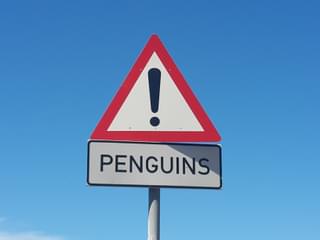
Particularly prevalent in Swaziland as a speed calming measure, the speed bumps are monstrous, unpainted, and generally appear in sets of 3 without any warning. You’ll do a lot of damage to the under-carriage of your vehicle if you miss them. Which is easy to do especially when it’s dark or the weather is bad. Speeding is a major problem in Swaziland (I once heard it has been quite common for Swazi Transport Ministers to die in road accidents!) but I can’t help thinking they’ve solved one problem by creating another.
Tip: speed bumps occur primarily around built up areas such as Mbabane and Manzini, as well as schools, so slow down when you see people.
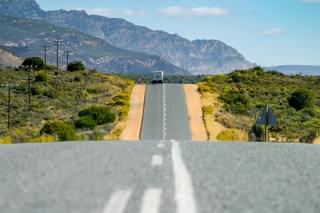
One thing I hate about being a tourist in South Africa is knowing that if we needed help, there really is no-one to call. You certainly wouldn’t contact the police, a huge proportion of whom are utterly corrupt (as our unpleasant experience above illustrates). Plus with dire warnings about not stopping the car in certain areas, you never know if the local people would come to your aid or in fact make the situation worse. A sad fact is that cultural and ethnic divisions in the country are still painfully obvious, making us feel very wary and uncomfortable whilst travelling through rural and non-white areas.
Tip: It is illegal to bribe a policeman in South Africa or to pay him directly, so if you’re stopped and ‘fined’, and can’t talk your way out of it, always ask for the official written paperwork. Many districts have cards available for tourists with anti-corruption phone numbers on which could be useful in a situation like we encountered at the airport. Show this to the officer who is asking for money, and if that doesn’t work, call the number on it. Hopefully that will do the trick.
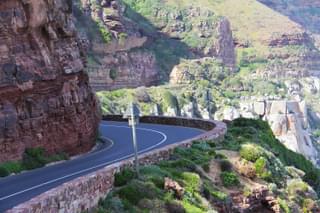
Weather
Throw a bit of bad weather into the mix and the dangers above become worse as they’re now hidden. We once drove through a zero visibility rain and mist storm so vast that it took 2 days to get from one side to the other. Honestly a couple of the most terrifying days of our lives. Locals didn’t alter their driving accordingly, and most never even bothered to put their lights on, which is just wonderful when you can’t see further than 2 feet ahead. Our subsequent blindness resulted in missed junctions, dozens of 3 point turns on blind corners, and fervent praying for no oncoming traffic.
Tip: don’t travel in such weather unless you absolutely have to. It’s the sort of thing that shortens your life expectancy!
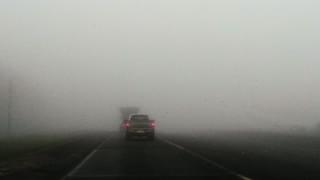
Finally, there is a bit of good news about driving on South Africa’s roads, aside from the stunning scenery, and that’s the petrol stations.
Never fill up yourself, always wait for an attendant to do that for you. Whilst he or she fills your vehicle, another team member will leap out from nowhere with a window cleaning squeegee and before you know it the soap suds are running down your windscreen. Yet another team member will be checking your tyre pressures. This used to irritate us, as often a tip would be required, but we’ve come to realise over the years that it’s actually quite useful. After all, the car does get caked in dust and it is helpful to be able to see out of the windscreen. It was also the attendants who noticed we had a slow puncture, and kindly pumped up the tyre each time we stopped at a petrol station, thus enabling us to limp back across the country to the airport. On our last trip many of them didn’t even wait for a tip, as they’re now paid an actual wage, so for us it’s just a little bonus.
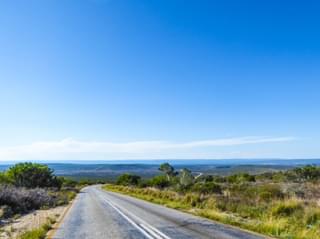
Wondering when to visit? Take a look at this guide on the best time to visit South Africa.
Looking for some more inspiration? Take a look at our best safari holidays ideas, our favourite family safaris, our big five safari guide or our top African safari honeymoon suggestions.
and start planning your tailor-made holiday

